Amid heated discussion on immigration and trade, Delta CEO Ed Bastian said the role of airlines is “making the world a more connected place.”
“We are very clear that our mission is bringing the world together and connecting people to each other, and anything that runs counter to that, obviously Delta is going to be opposed,” Bastian said.
Immigration “is an evolving issue, and we’re watching it,” he said, during comments after a Junior Achievement of Georgia “fireside chat” event with Virgin Group founder Richard Branson on Wednesday morning.
American Airlines asked the federal government to refrain from using it to transport immigrant children who had been separated from their families, according to the Dallas Morning News.
Bastian acknowledged that airlines have flown some children back to their homes to reunite with families, with the U.S. Department of Homeland Security involved in buying the tickets.
“It’s very limited, it’s minor in number,” Bastian said. “The kids that have been coming back to their families flying on the airlines have actually been reuniting, not actually separating.”
His remarks came hours before President Donald Trump signed an executive order to end migrant family separations.
While other major airlines issued statements asking the federal government not to fly immigrant children on their aircraft, some on Twitter directed questions or criticism at Delta on the topic.
But Delta, after the president signed the order, issued a statement saying: “Recent reports of families being separated are disheartening and do not align with Delta’s core values. We applaud the Administration’s Executive Order resolving the issue of separating children from their families at the U.S. border.”
Bastian said the airline’s customers “want to know where we stand on some of the important issues of the day. We have an opportunity to make a difference.”
“When you see something that runs against, that runs counter to your values, you’re obliged to speak on it,” he said.
“Within the populist movement, I think people are scared,” Bastian said. “Our business is bringing the world together.... When you see the world moving against that, it’s our call to action to jump in.”
But, he added: “You want to be careful. We’re not looking to become politicians.”
“In the business community.... there’s been a reluctance to engage,” Bastian said. Companies typically want to avoid stoking the ire of the public.
Delta gained attention -- both positive and negative -- when it discontinued a group discount for NRA members traveling to their convention this year, amid the debate over gun control in the wake of the Parkland, Fla. school shooting in February.
More broadly, Bastian said there’s “clearly a lack of political leadership in the world.... It’s not just in the U.S., although the U.S., we have a lot of challenges.”
“What it’s doing is forcing us as business leaders, as community leaders, to step into this void,” Bastian said. He pointed to Delta’s efforts to reduce its carbon footprint.
Virgin’s Branson said: “I personally think companies should not be involved in party politics, but I think that we are individuals and we should be able to speak out on issues that we feel strongly about.”
On tariffs, Bastian pointed to a decision on Delta's own tariff dispute in which the U.S. International Trade Commission ruled in favor of the airline. Delta had challenged massive proposed tariffs on planes made by Canadian aircraft maker Bombardier.
“We’re gratified to see that the process works and there’s an opportunity to win and push back against the tariff,” Bastian said.
“I think the generic ratcheting up of tariffs is wrong,” Bastian said. “But there certainly have been industries that have been harmed, and selectively, those issues should be explored.”
About the Author







